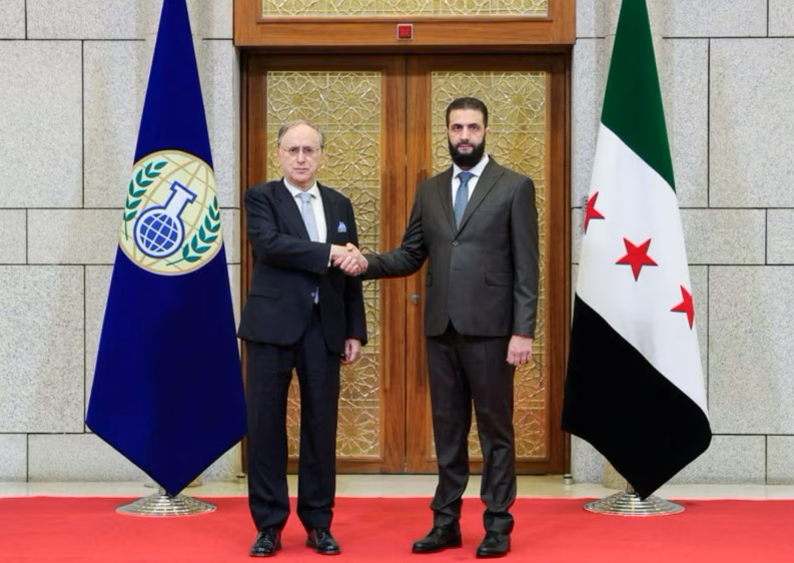
A series of meetings in Damascus last week has raised hopes that the full extent of Syria’s chemical weapons activity under the Assad regime will finally be revealed.
A delegation from the OPCW, the global chemical weapons watchdog, headed by its director-general, Fernando Arias, held “long, productive and very open” talks which included meetings with acting president Ahmad al-Sharaa and foreign minister Asaad Hassan al-Shaibani.
The result, according to the OPCW, was “an in-depth exchange of information, which will serve as a basis to reach tangible results and break the stalemate that has lasted for over eleven years”.
In 2013 hundreds of people died and many more were injured when rockets laden with the nerve agent sarin attacked Ghouta, a rebel-held area on the outskirts of Damascus. In the furore that followed, Syria joined the Chemical Weapons Convention and agreed to the destruction of all its chemical weapons together with related equipment and facilities.
Full details of Syria’s declaration were not made public but documents on the OPCW’s website showed the regime had disclosed 41 chemical facilities at 23 sites.
All forbidden chemicals declared by the regime were removed from Syria in 2014 and destroyed. The OPCW also verified the dismantling of all declared chemical weapon production facilities. This led to claims on social media that Syria no longer had any chemical weapons but the OPCW’s certification referred only to those that had been declared — and Syria’s initial declaration, as the regime later acknowledged, was incomplete.
While some of Syria’s omissions may have been unintentional, as time went on suspicions of deliberate concealment grew. In a blistering report in 2016, the OPCW’s director-general, Ahmet Üzümcü, complained that many of Syria’s answers to the assessment team’s questions were “not scientifically or technically plausible”. In many instances, he said, new information proffered by Syria “presents a considerable change in narrative from information provided previously — or raises new questions. In some cases, this new information contradicts earlier narratives.”
|
By 2020 it was clear that the regime had either retained some undeclared stocks of sarin or resumed production. OPCW investigators concluded that two sarin attacks on Ltamenah in 2017 had been carried out by the Syrian air force.
This prompted a resolution from the OPCW’s governing body — the Conference of the States Parties — calling on Syria to declare the facilities where the weapons used in Ltamenah had been “developed, produced, stockpiled, and operationally stored for delivery”. It also called on Syria to declare all chemical weapons currently in its possession and to resolve all 19 outstanding issues regarding its initial declaration.
Syria was given a 90-day deadline to comply, and when it failed to do so the states parties suspended its voting rights and banned it from holding any office within the OPCW. That, basically, remained the situation until the Assad regime suddenly collapsed last December.
Now, with an apparently more cooperative attitude from the new authorities, the OPCW has set out an action plan which includes compiling “an inventory of sites, equipment, munitions, chemicals, documents, people, and facilities” involved in the chemical weapons programme which —it hopes — will finally resolve the outstanding declaration issues.
There’s also a need to secure these facilities to ensure that any chemical weapons don’t fall into the hands of non-state actors.
Meanwhile, the OPCW continues investigating historical allegations of chemical attacks and who might have been responsible for them. While Assad remained in power there was little or no prospect of bringing any suspected perpetrators to justice but now he is gone there’s reason to hope that some of them, at least, will eventually be held accountable.

 RSS Feed
RSS Feed

